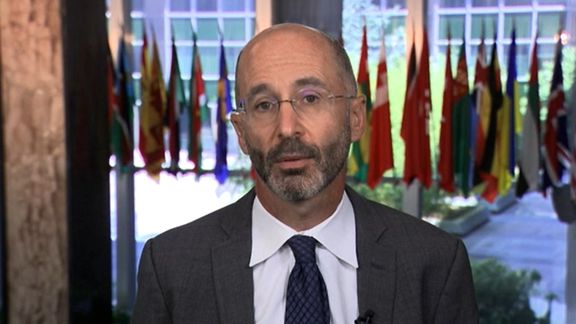US Envoy Says Iran Can Choose A Better Future Or Side With Russia

Reacting to Vladimir Putin’s visit to Tehran, US envoy Robert Malley said Tuesday Iran has a stark choice between a nuclear deal or more isolation with Moscow.

Reacting to Vladimir Putin’s visit to Tehran, US envoy Robert Malley said Tuesday Iran has a stark choice between a nuclear deal or more isolation with Moscow.
In an interview with CNN, Malley, the United States special envoy for Iran, said, “It can opt for a position of relative dependency on Russia, which itself is isolated internationally…or it can choose to come back into the deal that’s been negotiated...and have normal economic relations with its neighborhood and with Europe and the rest of the world.”
The special envoy suggested that not “getting back into the deal” would mean Iran “having to turn to Russia, having to sell on drones to Russia, a choice that is not a particularly attractive one…”
The US recently alleged that Russian officers visited Iran in June and July to review possible drone purchases. Malley said any drone shipment from Iran was “of course of concern” and would “bolster Russia’s ability to wreak havoc.” He said it “speaks volumes” that Iran would be in a position where it sold drones to Russia “against its professed position of neutrality in the conflict.” Without giving details, Malley said the US would “use the tools at our disposal” to sanction any supply of weapons to Russia.
Iran’s supreme leader Ali Khamenei, meeting President Vladimir Putin, gave Tuesday the clearest expression yet of support for Russia over Ukraine, which had “taken the initiative” while “the other side, with its own initiative would have created a war anyway.”
But Russia and Iran have long had some military cooperation, especially supporting President Bashar al-Assad in Syria, during the operation of the 2015 nuclear deal (the JCPOA, Joint Comprehensive Plan of Action) until President Donald Trump withdrew the US in 2018, prompting Iran to begin exceeding JCPOA limits in 2019.
Malley again called Trump’s decision to leave the agreement “catastrophic,” while reiterating that the onus to revive the JCPOA, which has been the subject of year-long negotiations between Iran and world powers, lay in Tehran.
‘A few weeks’
Malley dismissed a suggestion Iran might be responding to US actions, being pushed towards Russia for example not just by US ‘maximum pressure’ but by Biden’s statement during his recent trip to Israel and Saudi Arabia that the US would not leave a regional “vacuum” to be filled by Russia, China, and Iran.
Iran’s leaders have argued with President Joe Biden continuing Trump’s sanctions, has refused as part of JCPOA restoration to lift them all, including listing Iran’s Revolutionary Guards as a ‘foreign terrorist organization,’ and to give assurances it would not impede Iran in benefiting from the agreement.
Malley refused to give a deadline for JCPOA talks.He said Tehran was “a few weeks” from creating enough fissile material for a bomb, “if it chooses to enrich at that level,” although the weaponization “would take longer.”
“Every day” made JCPOA restoration and the return of Iran’s nuclear program to a “safe box” less likely, Malley argued. Terms for reviving the deal had been agreed, he suggested, by all parties in talks other than Iran – including Russia as well as the US, China, France, Germany and the United Kingdom.